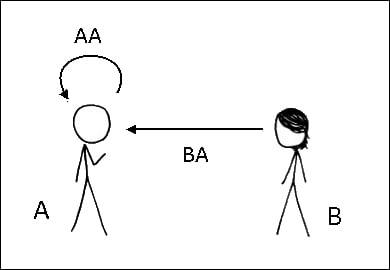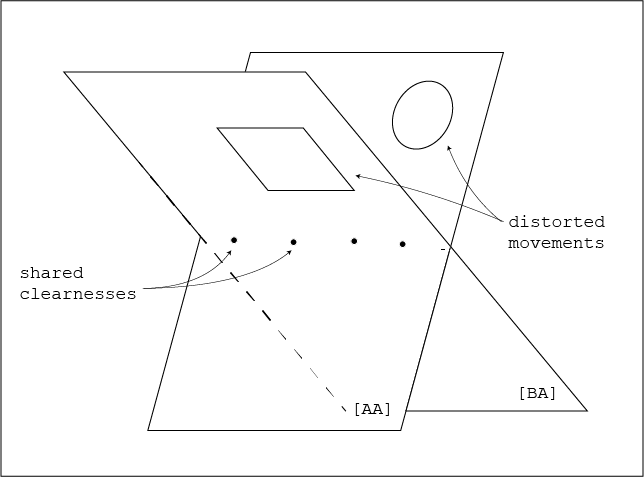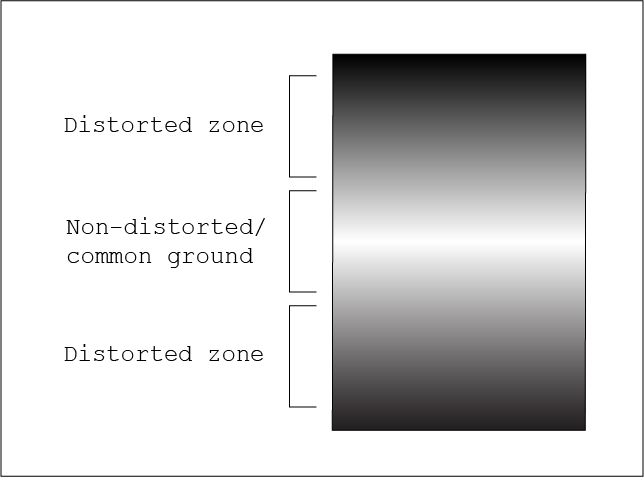- Bibliography
- Appendix 2: Other thoughts
- Appendix 1: The analogies
- Discussion
- Comparisons to mainstream knowledge
- Application: The cold gaze
- Application: Communication & perspective-taking
- Application: Finding balance point
- Application: Tea break
- Application: Writing
- Application: Analogy
- The model
- Introduction
- Preamble
When two persons really really want to communicate to each other, it’s not that they don’t want to put themselves in the other’s perspective, but because whatever one says it will be distorted in the other’s ears. If it’s not distorted, then they don’t have to really really want at the first place.
Let’s say we have a conversation:

When Cueball talks, every word he says is a clearness, with pre-existing fadenesses helping him jumping from one clearness to a next one, and in each clearness there is a whole perspective that he can access easily. But for Megan, she may:
- Have different perspective inside each clearness
- Have clearnesses in her perspective (BA) that don’t exist in Cueball’s perspective (AA)
- Not have the pre-existing fadenesses of Cueball
So even when there are clearnesses that both agree with, it’s very likely for misunderstanding to happen. We say their perspectives are distorted from each other:

Therefore, each of them has a distorted zone and a non-distorted zone (or common ground):

Some forms of distortion I know:
- Both persons believe that the other’s belief is bad
- One person believes that the other’s belief is bad, and the other can’t explain why they believe
- One person sees the other’s vision is unbelievable, and the other cannot prove it satisfactorily
- One person knows that their own behavior is bad, even betrayal, but don’t know how to confess it before too late
- One person knows they demand many contradictory things
- One person knows that their thinking is actually true and can give reason, but don’t know how to deal with the other’s self-esteem and insecurities
- Good arguments of one person are not understandable, so what are left are their bad arguments (negativity bias)
- One person defends themselves by talking on irrelevant things (rationalization)
These things actually are the same, but its exact representation is context-sensitive. Like the heisenbug, its transformative form makes it unable to catch, even though the problem always seems to be there. It can be caused by the lack of a concrete knowledge, the tip of the tongue phenomenon, the non-awareness of automatic thoughts, or the insecurity/anxiety/guilt. These factors shrink the non-distorted zone down.
In those situations, there is no time for cautious and polite. Any attempt to subtly message the feeling will become irrelevant to the listener, and just a single thought to sugarcoating the issue is enough to make the speaker feels unproductive or even passive-aggressive. When one still be worry and has to sugarcoat it, then the other still have a feeling of not being honest. When the effort to reduce one’s insecurity can evoke the insecurity of the other, then it is not just a blind leading a blind, but can become a blind fight.
But if both communicators realize their perspectives are just distorted versions from each other, then the communication will be easier. What is right or wrong will be blurred, and a lot of illusions, biases and blind spots will disappear. It encourages us to speak our feelings, but still protect our self-esteem in case what we voice is dismissed. We don’t have to abandon our perspective, but still be able to explore theirs. Not only we can build a theory of mind towards them, but also help them build a theory of mind towards us.
With a healthy attitude towards communication, both parties can see the benefits to construct it. By seeing the way to get out of the conflict before it even starts, there is no insecurity and therefore no distortion. By knowing that distortion is a natural thing to happen, there is no need to feel anxiety, shameful or guilty when addressing it. By remembering that our perspective can be distorted, the I-message will be used reflexively. Knowing ahead that the other person’s perspective is also distorted, we will be able to plan the conversation and identify the points that one side overlooks.
There are still distortions happen for both sides, but when that happens both can still listen mindfully and be curious for a perspective they don’t know of, instead of feeling frustrated or attacked. The vicious cycle will be converted to a language game, in which both players identify underlying fadednesses and form new clearnesses in both sides. The game is success when at least one player’s perspective is transformed, and they will have a joyful moment together. If everything goes wrong, they just need to take a break and start a new game.
I think all dissatisfactions in interpersonal communication can be solved when both sides understand this fact:
When we expect others to be logicians, they are just memorizers. But when others expect us to be memorizers, we forget.
If we can assume that others are just memorizers, then we can see that they don’t mean to harm us, even though it doesn’t seem so, and thus we can react calmly to that.
Leave a Reply